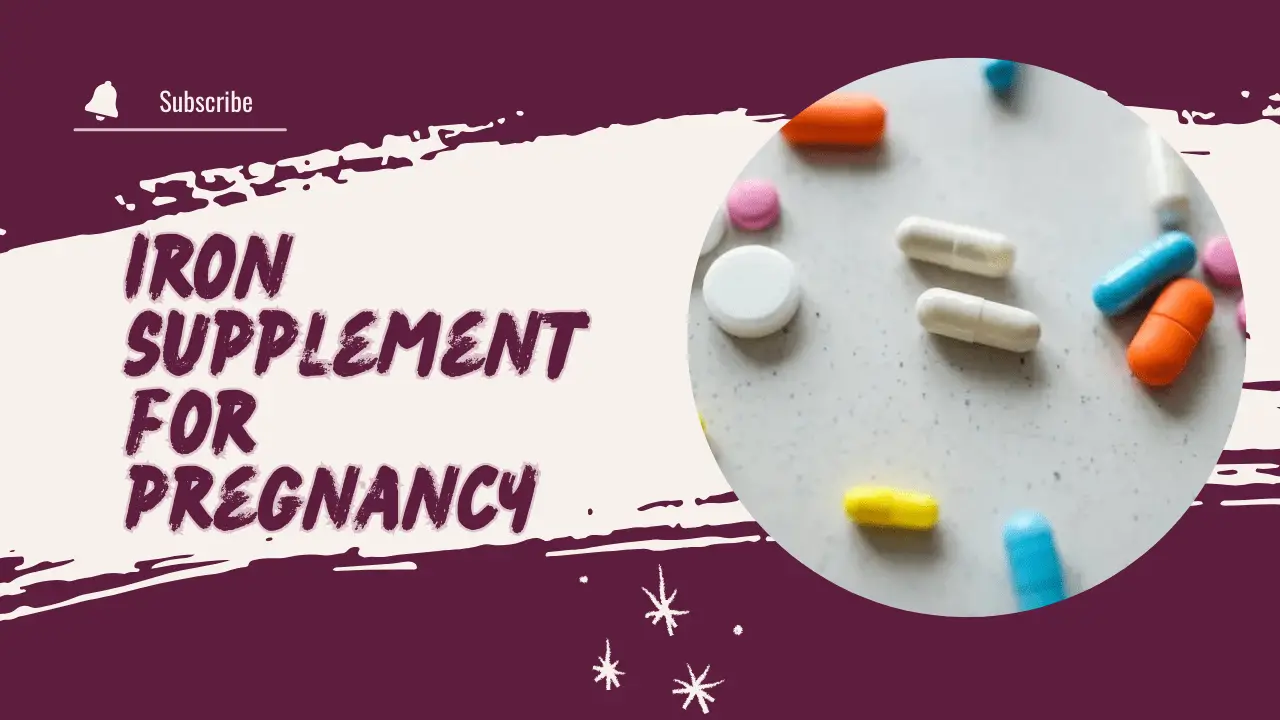While iron is an essential vitamin for all people, its importance increases during pregnancy. Sufficient levels of iron facilitate the growth of the placenta and fetus as well as the increased blood volume.
Because many expectant mothers find it difficult to maintain adequate iron levels through diet alone, iron supplements are often required. To optimize the benefits of iron supplements during pregnancy and maintain the health of both the mother and the unborn child, it is crucial to know when to take them.
The ideal times to take iron supplements, variables that affect iron absorption, and strategies for incorporating these supplements into your daily routine will all be covered in this blog post.
Why Iron is Crucial During Pregnancy:
The body needs iron, especially during pregnancy when a woman’s blood volume increases by about 50%. In addition to supporting the developing fetus and placenta, this increased blood volume helps the body be ready for the blood loss that happens during birthing.

Hemoglobin, the protein found in red blood cells that transports oxygen to the body’s tissues, is largely composed of iron. To guarantee that the mother and child receive enough oxygen for optimum health and development, adequate iron levels are necessary.
The Role of Iron in the Body
Iron is involved in several critical functions beyond oxygen transport. It supports immune function, aids in energy production, and helps maintain healthy skin, hair, and nails. During pregnancy, iron’s role in immune support is particularly important, as a strong immune system can help protect both the mother and the developing baby from infections.
Increased Iron Needs During Pregnancy
Women who are pregnant need a lot more iron than normal. About 27 milligrams of iron per day is suggested during pregnancy, which is about twice as much as non-pregnant women require. The baby’s growth and the placenta’s development, both of which depend significantly on iron, are the causes of this increasing requirement.
Iron also contributes to the development of the baby’s blood supply, which is essential for their general growth and oxygenation. Knowing why iron is essential during pregnancy emphasizes how important it is to know when to take iron supplements.
When the supplements are taken at the right time, the mother and the unborn child can both benefit fully from increased iron absorption.
When to Take Iron Supplements for Pregnancy:
Timing is essential when it comes to taking iron supplements during pregnancy to maximize their effectiveness and minimize potential side effects. Knowing the best time to take iron supplements can help ensure optimal absorption and support the health of both the mother and the baby.

General Guidelines on Timing
Iron supplements are most effective when taken on an empty stomach, as certain foods and drinks can inhibit iron absorption. However, some pregnant women may experience nausea or gastrointestinal discomfort when taking supplements without food.
To balance these concerns, it can be helpful to take iron supplements either one hour before or two hours after a meal.
Factors Influencing the Timing of Supplementation
What time is ideal to take iron supplements during pregnancy depends on a number of factors. For example, combining iron with foods or beverages high in vitamin C, such as orange juice, can improve absorption.
On the other hand, foods heavy in fiber, tea, coffee, and calcium might decrease the absorption of iron and should be avoided right before taking supplements. Individual schedules and habits also matter; some women find that taking their supplements at a specific time of day, whether in the morning or the evening, is easier to remember and endure.
It’s important to take these recommendations and variables into account when determining when to take iron supplements while pregnant. Pregnant women can enhance iron absorption, lower their chance of adverse effects, and better support both their own and their unborn child’s growth by carefully timing their supplementation.
Types of Iron Supplements:
Choosing the right type of iron supplement is crucial during pregnancy to ensure adequate iron levels and support the health of both mother and baby. There are several forms of iron supplements available, each with its own advantages and potential drawbacks. Understanding these options can help pregnant women make informed decisions about their supplementation.
Different Forms Available
-
Ferrous Sulfate
-
- Overview: The most commonly prescribed form of iron supplement.
- Advantages: Widely available and affordable.
- Drawbacks: Can cause gastrointestinal side effects like constipation and nausea.
-
Ferrous Gluconate
-
- Overview: A milder form of iron supplement.
- Advantages: Generally easier on the stomach compared to ferrous sulfate.
- Drawbacks: Lower iron content per tablet, which may require higher doses.
-
Ferrous Fumarate
-
- Overview: Another common type of iron supplement.
- Advantages: Contains a higher concentration of elemental iron.
- Drawbacks: Can also cause gastrointestinal side effects similar to ferrous sulfate.
-
Iron Polysaccharide Complex
-
- Overview: A newer form of iron supplement.
- Advantages: Less likely to cause gastrointestinal discomfort.
- Drawbacks: More expensive and may not be as widely available.
-
Heme Iron Supplements
-
- Overview: Derived from animal sources.
- Advantages: Better absorbed by the body compared to non-heme iron supplements.
- Drawbacks: Typically more expensive and less common.
Pros and Cons of Each Type
The best iron supplement for each person will depend on their needs and tolerances. The most popular kind, ferrous sulfate, is efficient but might not be good for people with sensitive stomachs.
Ferrous fumarate and ferrous gluconate are substitutes with varying degrees of adverse effect and efficacy. Supplements containing heme iron and iron polysaccharide complex are more expensive but helpful for people with gastrointestinal problems.
The kind of supplement taken during pregnancy can also affect when to take iron supplements. To optimize absorption and reduce adverse effects, certain forms might need to be taken at particular times in relation to meals.
Consulting with a healthcare provider can help determine the best type and timing for iron supplementation during pregnancy, ensuring both mother and baby receive the necessary support for optimal health.
Optimal Times to Take Iron Supplements:
Timing plays a crucial role in the effectiveness of iron supplements during pregnancy. Knowing when to take iron supplements for pregnancy can significantly enhance iron absorption and reduce potential side effects.
Morning vs. Evening
Taking iron supplements in the morning on an empty stomach is often recommended for optimal absorption. However, some women may experience nausea or discomfort. For these individuals, taking the supplement in the evening can be a better option, as it might lessen gastrointestinal side effects and can fit better into their daily routine.
With Meals vs. On an Empty Stomach
The optimal time to take iron supplements is on an empty stomach, preferably an hour or two before or after a meal. Nonetheless, they can be taken with a tiny bit of food if taking them without food makes you sick to your stomach.
When taking supplements, it’s crucial to stay away from foods heavy in calcium, tea, coffee, and carbohydrates as these can prevent the body from absorbing iron. By knowing these ideal periods, expectant mothers can better support their health and the growth of their unborn child by taking iron supplements at the appropriate intervals during pregnancy, which will ensure greater absorption and fewer side effects.
Signs You Might Need Iron Supplements:
Recognizing the signs of iron deficiency during pregnancy is crucial for timely intervention. Knowing when to take iron supplements for pregnancy can help prevent complications and ensure the health of both mother and baby.

Symptoms of Iron Deficiency
- Fatigue and Weakness: Feeling unusually tired or weak is a common sign of iron deficiency.
- Pale Skin: A noticeable paleness in the skin or mucous membranes can indicate low iron levels.
- Shortness of Breath: Difficulty breathing, especially during physical activity, might suggest a need for iron supplements.
- Dizziness and Headaches: Frequent dizziness or headaches can be symptoms of iron deficiency anemia.
- Cold Hands and Feet: Poor blood circulation due to low iron levels can cause cold extremities.
When to Consult a Healthcare Provider
If you notice any of these symptoms, be sure to reach out to a healthcare provider. They can perform blood tests to confirm iron deficiency and recommend appropriate supplementation.
Understanding when to take iron supplements for pregnancy can help mitigate these symptoms and support a healthy pregnancy.

Recognizing these signs early and knowing when to take iron supplements for pregnancy can ensure timely treatment, improving the overall health and well-being of both mother and baby.
Dietary Sources of Iron:
In addition to supplements, consuming iron-rich foods is essential during pregnancy to meet the increased iron needs. Understanding dietary sources can complement the knowledge of when to take iron supplements for pregnancy, ensuring optimal iron levels.
Iron-Rich Foods
- Red Meat and Poultry: These are excellent sources of heme iron, which is easily absorbed by the body.
- Leafy Green Vegetables: Spinach, kale, and other greens provide non-heme iron, which is beneficial when consumed with vitamin C-rich foods.
- Legumes and Beans: Lentils, chickpeas, and beans are good plant-based iron sources.
- Fortified Cereals: Many cereals are fortified with iron, making them a convenient dietary option.
Combining these dietary sources with appropriate supplementation helps maintain adequate iron levels, supporting both maternal and fetal health during pregnancy.
Potential Side Effects and How to Manage Them:
Understanding the potential side effects of iron supplements during pregnancy is crucial for managing their impact on maternal health. Knowing when to take iron supplements for pregnancy can help mitigate these effects.
Common Side Effects
- Gastrointestinal Issues: Nausea, constipation, and stomach upset are common.
- Dark Stools: Iron supplements can cause stools to appear darker than usual.
- Teeth Staining: Liquid iron supplements can stain teeth temporarily.
Managing Side Effects
To minimize discomfort, consider taking supplements with food or before bed. Ensure adequate hydration and include fiber-rich foods in your diet. Consult a healthcare provider if side effects persist or worsen.
Understanding these factors helps pregnant women navigate iron supplementation effectively, promoting overall maternal and fetal well-being.
Conclusion:
Maintaining optimum health throughout pregnancy requires knowing when to take iron supplements. Women can improve iron absorption, reduce side effects, and promote their own health as well as the healthy development of their unborn child by knowing when and how to take supplements.
For individualized counsel and direction during pregnancy, it’s critical to speak with healthcare professionals to make sure iron levels stay appropriate for a smooth and safe pregnancy experience. Click to learn more.
FAQs:
1: When is the best time to take iron supplements during pregnancy?
Answer: The best time is typically on an empty stomach, either one hour before or two hours after a meal, to maximize absorption.
2: How do I know if I need iron supplements during pregnancy?
Answer: Symptoms like fatigue, pale skin, and shortness of breath can indicate iron deficiency. Consult your healthcare provider for a blood test to confirm.
3: What foods should I avoid when taking iron supplements?
Answer: Avoid consuming calcium-rich foods, tea, coffee, and high-fiber foods close to the time of taking iron supplements, as they can inhibit absorption.
4: What are the common side effects of iron supplements during pregnancy?
Answer: Common side effects include nausea, constipation, stomach upset, and dark stools.
5: Can I take iron supplements with other medications or prenatal vitamins?
Answer: It’s best to consult your healthcare provider before combining iron supplements with other medications or prenatal vitamins to avoid potential interactions.
